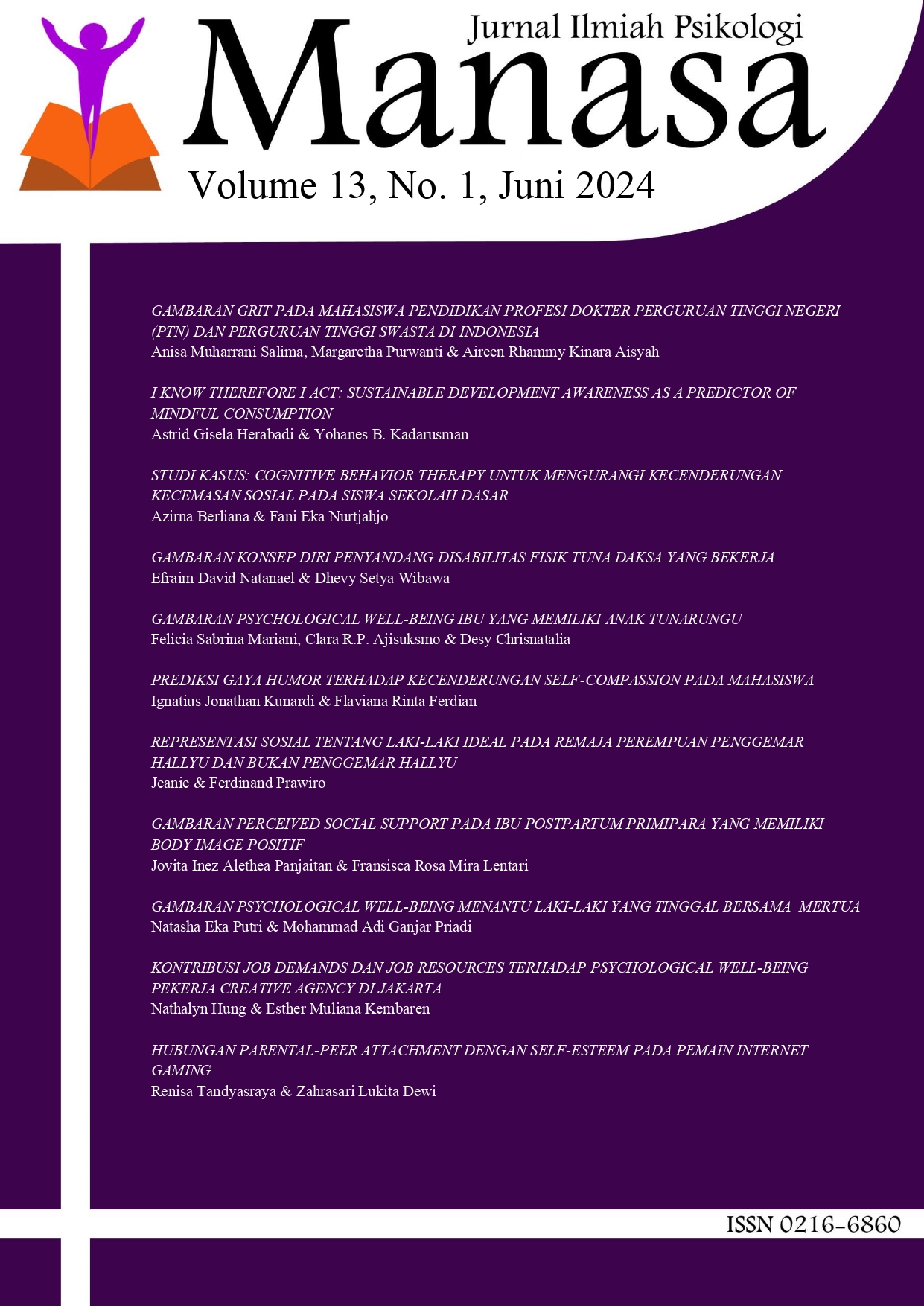HUBUNGAN PARENTAL-PEER ATTACHMENT DENGAN SELF-ESTEEM PADA PEMAIN INTERNET GAMING
DOI:
https://doi.org/10.25170/manasa.v13i1.5468Keywords:
online gaming, parental-peer attachment, self-esteemAbstract
There are many internet-based activities, one of which is internet gaming, which, at a certain level of frequency, can lead individuals to internet addiction. This research, conducted with meticulous attention to detail, aims to determine the relationship between parental-peer attachment and self-esteem as two factors that are closely related to internet addiction behavior. The study was meticulously conducted on 38 young adult male and female internet gaming players using the Inventory of Parent and Peer Attachment-Revised (IPPA-R) and the Self-Esteem Scale (SES). Data were rigorously analyzed using one-tailed Spearman statistical analysis. The results show a positive relationship between Parental-Peer Attachment and Self-Esteem in internet gaming players. The alienation dimension in Mother, Father, and Peer Attachment has the most significant relationship. Self-competence and Self-liking dimensions have a negative relationship, so that these two dimensions will decrease or increase if one dimension experiences a decrease or increase. Further studies on the other psychological factors that underly internet gaming behavior potentially support the prevention of addiction.
References
American Psychiatric Association. (2013). Diagnostic and statistical manual of mental disorders: DSM-5TM (5th ed.). (5th ed.). American Psychiatric Publishing, Inc.
Arokiasamy, L., Kanan, N., & bin Ismail, M. R. (2019). A study on parenting styles and parental attachment in overcoming internet addiction among children. Global Business and Management Research, Suppl. Special Issue, 11(2), 409–419. ProQuest One Business.
Bowling, A. (2005). Measuring health: A review of quality of life measurement scales. 3rd.
C. Armsden, G., & Greenberg, M. (1987). The inventory of parent and peer attachment: Individual differences and their relationship to psychological well-being in adolescence. Journal of Youth and Adolescence, 16, 427–454.
Clement, J. (2024). Online gaming—Statistics & Facts. Statista.
Creswell, J. W. (2014). Research design: Qualitative, quantitative, and mixed methods approaches (4th ed.). Sage Publications.
Kuss, D. J., & Griffiths, M. D. (2012). Internet gaming addiction: A systematic review of empirical research. International Journal of Mental Health and Addiction, 10(2), 278–296. https://doi.org/10.1007/s11469-011-9318-5
Ramadhan, P. (2022). Demi Game Online, 2 Pemuda di Tanjungbalai Bobol Kios Tetangga. https://www.detik.com/sumut/hukum-dan-kriminal/d-6110456/demi-game-online-2-pemuda-di-tanjungbalai-bobol-kios-tetangga
Riady, E. (2022). Terjebak Hidup Hedon, Pekerja Serabutan Ini Nekat Curi Uang Tetangga. https://www.detik.com/jatim/hukum-dan-kriminal/d-5980689/terjebak-hidup-hedon-pekerja-serabutan-ini-nekat-curi-uang-tetangga
Santrock, J. W. (2011). Life-span development (13th ed). McGraw-Hill.
Shiers, J. (2020). Expert advice on gaming addiction in young people and children. https://www.internetmatters.org/hub/news-blogs/expert-advice-on-gaming-addiction-in-young-people-and-children/
Sibbald, C. G. (2019). Parental dan peer attachment pelaku bullying: Studi pada remaja di Jakarta. Atma Jaya.
Yoshikawa, M. (2019). Addiction specialist urges Japan to treat over-gaming as a mental disorder. The Japan Times. https://www.japantimes.co.jp/news/2019/03/14/national/social-issues/japanese-doctor-wages-war-internet-addiction-advising-rehab-online-gamers/#.XZosm2YxWM8
Downloads
Published
Issue
Section
License
Copyright (c) 2024 MANASA

This work is licensed under a Creative Commons Attribution-NonCommercial-ShareAlike 4.0 International License.









.png)
.png)

